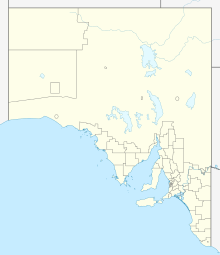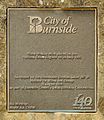Wheal Watkins mine facts for kids
| Location | |
|---|---|
| Location | Glen Osmond |
| State | South Australia |
| Country | Australia |
| Coordinates | 34°57′42″S 138°39′20″E / 34.961722°S 138.655446°E |
| Production | |
| Products | Lead Silver |
| History | |
| Opened | 1843 |
| Closed | 1916 |
| Owner | |
| Company | Wheal Gawler Mining Association Adelaide Silver Lead Company Tarcoola Development Syndicate |
The Wheal Watkins mine is an old lead and silver mine located in Glen Osmond, South Australia. It first operated from 1844 to 1850. After that, it opened briefly in 1888-1889 and again in 1916. From 1986, people could visit the mine on guided tours. However, a rockfall in 2005 caused it to close.
Contents
How the Mine Started
The Wheal Watkins mine was built after another mine called Wheal Gawler, which opened in May 1841. A person named James Heneker first found the valuable mineral called galena in this area. Galena is a natural form of lead sulfide, which is where lead and silver come from.
Buying the Land
In December 1841, a man named Mr. Watkins from England bought the land where the Wheal Watkins lead and silver were found. His agent in South Australia, Peter Peachey, opened the mine for him in 1843. Mining officially began in May 1844.
Miners discovered that the rock they dug up contained 70% lead and about 30 ounces of silver per ton. This ore was sold in London for a good price.
Working at the Mine
Thomas Williams was the main person in charge of the mine's work. A group of skilled miners from Cornwall, England, were hired. The word 'wheal' in the mine's name comes from the Cornish language. It means 'place of work'.
In its first year, the mine employed between twelve and eighteen people. In the first seven months, they dug up 150 tons of ore. About 100 tons of this ore was sent to England. A hotel nearby, called The Miner's Arms, offered places to stay and supplies for visitors and workers.
Peter Peachey, who helped start the mine, passed away in 1850. Work at the mine continued for a short time. The mine eventually closed because of high costs and many miners leaving to find more valuable gold during the Victorian gold rush in 1851.
Later Mining Efforts
The mining area, which included the nearby Wheal Gawler and Glen Osmond mines, had a short period of new activity in 1888. During this time, Captain Rowe led the operations. A report from 1888 also called the Wheal Watkins mine "Peachey's lode."
In 1913, a miner felt dizzy while deep inside the mine. Luckily, his partner saved him from falling. They lowered a rope with a loop, and the miner was pulled safely to the surface.
The last group to officially work the mine was the Tarcoola Development Syndicate in 1916.
Mine Closure
After the mine closed, some of its tunnels and shafts remained open. There were a few times when people or animals accidentally fell into these holes or got stuck. For example, a dog and a cow both fell in, but they were rescued safely.
Protecting the Mine
The Wheal Watkins mine is an important historical site. It was added to the South Australian Heritage Register in 1984. It was also listed on the now-closed Register of the National Estate in 1996. The mine was reopened for tours by Stephen Baker, who was the Minister for Mines at the time.
Public Tours and Rockfall
In 2004, tours of the mine started from the Burnside Council Chambers. The full trip took about two hours. Tours happened on the third Sunday of each month. Tickets cost $7 for adults and $4 for children.
However, in 2005, the mine had to close again after a rockfall. This meant it was no longer safe for visitors.
Efforts to Reopen
In 2008, a generous gift of $30,000 AUD was given to the City of Burnside Council. This money was meant to help fix the mine and make it safe to reopen for tours. The person who gave the money, John Clark, had helped with tours of the mine since 1986. He even appeared on a TV show called Postcards that featured the Glen Osmond mines.
In 2008, two experts, Ross Both and Greg Drew, wrote about the Glen Osmond mines. They said it was very important to repair the tunnels of the Wheal Watkins mine. They believed this would allow people to visit one of Australia's most important mining history sites again.
In 2013, Mayor David Parkin mentioned that local taxpayers had spent a lot of money on preserving these mines over the years. He suggested that there might be a limit to how much more could be spent.
As of March 2016, the mine is still closed to the public. The Burnside Historical Society hopes to work with the council to reopen the mine for tours. They also plan to create a display for visitors. This display will include a pick found in the Glen Osmond mine and a piece of galena.
Gallery
 | Jessica Watkins |
 | Robert Henry Lawrence Jr. |
 | Mae Jemison |
 | Sian Proctor |
 | Guion Bluford |





